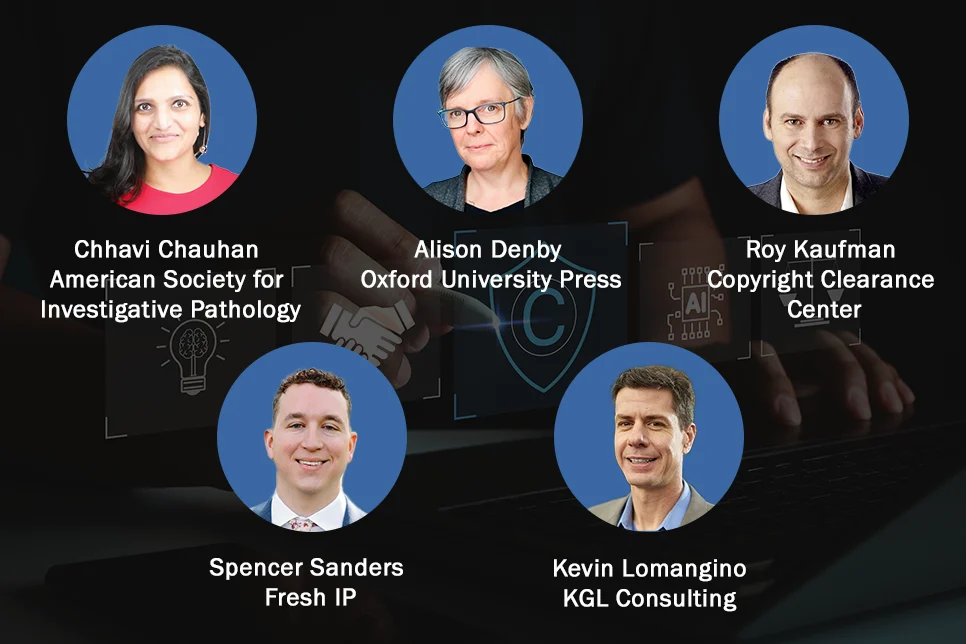The landscape of AI in scholarly publishing is changing fast—especially when it comes to contracts. While publishers have access to a wealth of information on how AI works and how it can be applied throughout the publishing process, many bemoan a distinct lack of information on how AI is impacting revenue models, how we might navigate potential risks to protect our IP and what terms we need to give special consideration in our agreements with partners.
Recently KGL hosted a popular webinar entitled Smart Contracts in the Age of AI, designed to help society publishers demystify this complex topic and build a better understanding of how the contract process is evolving. Alongside KGL’s Kevin Lomangino, Chhavi Chhauhan (American Society for Investigative Pathology), Alison Denby (Oxford University Press), Roy Kaufman (Copyright Clearance Center) and Spencer Sanders (Fresh IP) shared their valuable insights.
Thoughtful But Active Engagement
Framing the debate, Kevin Lomangino highlighted the importance of keeping an open mind when it comes to AI, commenting: “Our guidance to our society partners is that they should be thoughtfully and actively engaging with AI. In our view, this is going to be a transformative shift and one that you are going to need to navigate through experimentation and taking calculated risks.” He added: “The question is how do we approach decision-making around AI and protect our values while still evolving with the technology.”
Murky Legal Waters
However, with over 40 active US court cases associated with the use of copyrighted materials for LLP model training, the publishing industry is facing an uphill struggle as courts and regulators grapple to apply existing legal frameworks to new technologies. Commenting on the impact AI is currently having on the copyright debate, Copyright Clearance Center’s Roy Kaufman said: “Most countries don’t even have laws on AI, and those that do are not very consistent. This is compounded by dozens of lawsuits in different jurisdictions in different stages in their respective processes, which will likely have different results.”
Spotlighting licensing as the best way society publishers can protect their IP, he stated: “Applying existing copyright principles to AI is murky. But if you’re not actively licensing your content, you’re more likely to lose the ability and the right to license that content in the future, and you are therefore putting your copyrights at risk.”
Complexities around “fair use” are often a commonality in many of these high-profile court cases around AI and copyright. Spencer Sanders of Fresh IP said: “I think until all fair use questions are fully fleshed out and answered, to avoid the cost of litigation and maintain trust and cohesion in the industry, we’re likely to see a shift in AI specific clauses at every level, from publisher to society and from society to author.”
Guardrails Are Essential
With a growing number of licensing deals being struck between publishers and technology firms, getting the details right in contracts is key. “When it comes to training AI, we have many technology companies coming to us who want to work with a publisher’s support and are prepared to pay to license copyrighted content,” said Alison Denby from Oxford University Press, who represents over 300 societies.
“When we approach these relationships, we always ensure that we include guardrails in our contracts about where and how that content can be used and when. And when we are discussing licensing deals that might involve summarization of content, one of our top priorities is to link back to the primary content source and make sure that the relevant citations and attributions are there.”
Priorities for Societies
“The billion-dollar question here is how do we as society publishers and publishing partners secure our bottom line?” questioned Chhavi Chauhan while discussing the evolving role of societies. “It’s critical that we align our decision-making, keeping in mind our missions and values while carefully deliberating on the communities that we serve. We really need to focus on developing standards and provenance markers, and we must do this while maintaining public trust and ensuring sustainable reproducibility of scholarly content.”
To view the full recording of the Smart Contracts in the Age of AI webinar, including speaker presentations and a lively Q&A session, click here.
KGL Consulting helps publishers navigate the legal, ethical, and financial dimensions of AI adoption. Whether you’re reevaluating license terms, developing AI use policies, or exploring new revenue models, we can help you move forward with confidence. Start the conversation at kwglobal.com/consulting.





